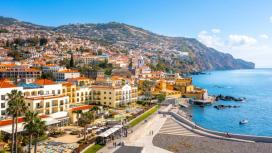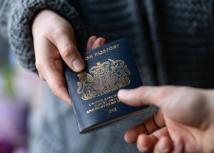
المدونة • November 28, 2024 • 4 دقيقة
الدليل الشامل لتصريح السفر الإلكتروني للمملكة المتحدة
قدمت المملكة المتحدة تصريح السفر الإلكتروني (UK ETA) لتعزيز الأمن الحدودي وتسهيل السفر للمواطنين المعفيين من التأشيرات. يعد هذا النظام تحديثاً محورياً في سياسات الهجرة البريطانية، وقد أصبح أمراً ضرورياً يجب على المسافرين التعرف عليه بسبب المرحلة الحالية من تطبيقه. ما هو تصريح السفر الإلكتروني للمملكة المتحدة؟ تصريح السفر الإلكتروني للمملكة المتحدة (UK ETA) هو تصريح رقمي مسبق للسفر مطلوب من المواطنين المعفيين من التأشيرة الذين يزورون المملكة المتحدة لفترات قصيرة. تم تصميمه لتبسيط عملية الدخول وضمان الأمن والتوافق مع الاتجاهات العالمية في أنظمة إدارة السفر. الميزات الرئيسية لتصريح السفر الإلكتروني للمملكة المتحدة تصريح رقمي: عبر الإنترنت بالكامل وسهل التقديم. الزيارات قصيرة المدى: صالح للسياحة أو العمل أو الزيارات العائلية لمدة تصل إلى ستة أشهر. تصريح متعدد الدخول: صالح لمدة عامين أو حتى انتهاء صلاحية جواز السفر المرتبط به، أيهما يأتي أولاً. تواريخ تطبيق تصريح السفر الإلكتروني للمملكة المتحدة يتم تقديم تصريح السفر الإلكتروني للمملكة المتحدة على مراحل، استنادًا إلى جنسيات المسافرين. إليك التواريخ الرئيسية للتنفيذ: ٢٢ فبراير ٢٠٢٤: يجب على مواطني البحرين والكويت وعمان والمملكة العربية السعودية والإمارات العربية المتحدة الحصول علىتصريح السفر الإلكتروني للمملكة المتحدة. ٨ يناير ٢٠٢٥ (تفتح الطلبات في ٢٧ نوفمبر ٢٠٢٤): يجب على مواطني دول مثل أستراليا وكندا واليابان والولايات المتحدة الأمريكية الحصول على تصريح السفر الإلكتروني للمملكة المتحدة. ٢ أبريل ٢٠٢٥ (تفتح الطلبات في ٥ مارس ٢٠٢٥): يجب على مواطني معظم الدول الأوروبية، بما في ذلك فرنسا وألمانيا وإسبانيا، الحصول على تصريح السفر الإلكتروني للمملكة المتحدة. من يحتاج إلى تصريح السفر الإلكتروني للمملكة المتحدة؟ إذا كنت مسافراً إلى المملكة المتحدة في التواريخ المحددة أو بعدها، فستحتاج إلى تصريح السفر الإلكتروني للمملكة المتحدة. إليك التفاصيل كاملة: السفر في ٢٢ فبراير ٢٠٢٤ أو بعده: البحرين الكويت عمان المملكة العربية السعودية الإمارات العربية المتحدة السفر في ٨ يناير ٢٠٢٥ أو بعده (تفتح الطلبات في ٢٧ نوفمبر ٢٠٢٤): أندورا أستراليا كندا هونج كونج (المواطنون البريطانيون في الخارج) اليابان موناكو نيوزيلندا سنغافورة كوريا الجنوبية تايوان الولايات المتحدة الأمريكية السفر في ٢ أبريل ٢٠٢٥ أو بعده (تفتح الطلبات في ٥ مارس ٢٠٢٥): النمسا بلجيكا بلغاريا كرواتيا قبرص جمهورية التشيك الدنمارك إستونيا فنلندا فرنسا ألمانيا اليونان هنغاريا إيطاليا لاتفيا ليختنشتاين ليتوانيا لوكسمبورغ مالطا هولندا النرويج بولندا البرتغال رومانيا سلوفاكيا سلوفينيا إسبانيا السويد سويسرا كم تبلغ تكلفة تصريح السفر الإلكتروني للمملكة المتحدة؟ تصريح السفر الإلكتروني للمملكة المتحدةميسور التكلفة بقيمة ١٠ جنيه إسترليني لكل متقدم. إليك التفاصيل: الرسوم الفردية: يجب على كل مسافر دفع ١٠ جنيه إسترليني، بغض النظر عن مدة الزيارة. طرق الدفع: يمكن دفع الرسوم باستخدام بطاقات الائتمان/الخصم أو المحافظ الرقمية مثل Apple Pay وGoogle Pay الصلاحية: تغطي رسوم ١٠ جنيه إسترليني الدخول المتعدد خلال فترة الصلاحية التي تبلغ سنتين أو حتى انتهاء صلاحية جواز السفر. كيفية التقديم للحصول على تصريح السفر الإلكتروني للمملكة المتحدة التقديم للحصول علىتصريح السفر الإلكتروني للمملكة المتحدة بسيط ويتم بالكامل عبر الإنترنت: ١. الوصول إلى بوابة التقديم:استخدم الموقع الرسمي لحكومة المملكة المتحدة أو تطبيق "UK ETA" للهاتف المحمول. متجر آبل: تحميل تطبيق UK ETA متجر جوجل بلاي: تحميل تطبيق UK ETA ٢. تقديم المعلومات الشخصية:أدخل التفاصيل مثل اسمك وتاريخ ميلادك ورقم جواز سفر وخطط سفرك. ٣. إجابة الأسئلة الأمنية:أكمل استبياناً قصيراً ٤. تحميل صورة رقمية:تأكد من أنها تفي بمعايير المملكة المتحدة. ٥. دفع رسوم التقديم:قدم دفعة قدرها ١٠ جنيه إسترليني. ٦. انتظر المعالجة:يتم معالجة معظم الطلبات في غضون ثلاثة أيام عمل. ٧. استلام الموافقة:بمجرد الحصول على الموافقة، سيتم ربطتصريح السفر الإلكتروني الخاص بالمملكة المتحدة إلكترونياً بجواز سفرك. ملاحظة: يتوفر تطبيق UK ETA لكل من أجهزة iOS وAndroid. تأكد من أن جهازك يفي بالمتطلبات اللازمة قبل التحميل. فوائد تصريح السفر الإلكتروني للمملكة المتحدة يوفر تصريح السفر الإلكتروني للمملكة المتحدة العديد من المزايا لكل من المسافرين وحكومة المملكة المتحدة: لماذا يفيد المسافرين: يبسط عملية الدخول. يوفر تطبيقاً رقمياً وخالياً من التعقيدات. يسمح بزيارات متعددة خلال فترة صلاحيته. لماذا يفيد حكومة المملكة المتحدة: يعزز الأمن الحدودي من خلال الفحص المسبق. يقلل من أوقات الانتظار عند نقاط الدخول. يحسن إدارة الهجرة. الإعفاءات من تصريح السفر الإلكتروني للمملكة المتحدة ليس جميع المسافرين ملزمين بتقديم طلب للحصول علىتصريح السفر الإلكتروني للمملكة المتحدة، المجموعات التالية معفاة: المواطنون البريطانيون والإيرلنديون حاملو التأشيرات الحالية:أولئك الذين لديهم تأشيرات صالحة للمملكة المتحدة أو تصاريح دخول أخرى. المقيمون في منطقة السفر المشتركة:المسافرون داخل أيرلندا أو غيرنسي أو جيرسي أو جزيرة مان لا يحتاجون إلى تصريح السفر الإلكتروني للمملكة المتحدة. ابقَ على اطلاع بشأن تصريح السفر الإلكتروني للمملكة المتحدة يعد تصريح السفر الإلكتروني للمملكة المتحدة، مع تطبيقه التدريجي الذي يبدأ في فبراير ٢٠٢٤، خطوة هامة نحو تحسين سياسات السيطرة على الحدود والهجرة في المملكة المتحدة. إن فهم متطلباته ومتابعة التحديثات الخاصة به يساعد في ضمان رحلة خالية من التعقيدات. لجعل تخطيط سفرك أسهل، قم بقراءة المقالات الخاصة بنا أو اشترك في نشرتنا الإخبارية للحصول على أحدث المعلومات حولتصريح السفر الإلكتروني للمملكة المتحدة والمواضيع المتعلقة بالسفر. إن البقاء على اطلاع بالتغييرات سيساعدك في التحضير الكامل لدخول المملكة المتحدة بشكل سلس.
أحدث المقالات













البرتغال | الإقامة عبر الاستثمار
هل أنت جاهز للتقديم؟
الاستعلام عن الجنسية

